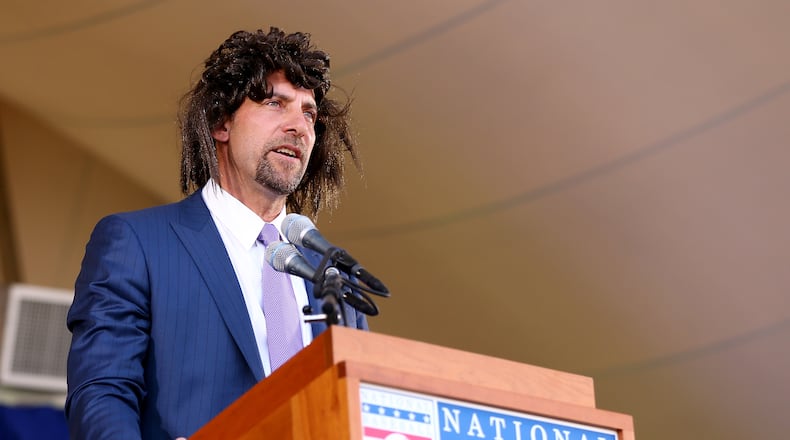The franchise that gave us “Spahn and Sain, then pray for rain” doesn’t have to worry about the third day this time around.
The Braves and Cooperstown have their new three-man rotation. It doesn’t matter how you stack John Smoltz, Greg Maddux or Tom Glavine — by their power, command, long-term success, big-game performance or ability to paint corners. They spent 10 seasons together with the Braves, six of them in the starting rotation. Their reunion in Cooperstown on Sunday was long anticipated and richly deserved.
The pecking order? Glavine had a thought.
“We each get three innings, but John has to close,” he said after seeing his former teammate honored.
Smoltz became one of baseball’s 1 percent for the way he started (200-plus wins) and the way he finished (150-plus saves). He did neither on induction Sunday. Four honorees gave speeches. Smoltz spoke second. He had to, for a long and celebrated moment in a middle relief role.
He said he would keep his comments to 18 minutes. Nobody believed him. He went just over 29 and even that was a struggle. Some claimed to have clocked his speech at 29 minutes, 29 seconds, matching his uniform number twice. If so, it’s a good thing he wasn’t an offensive lineman.
Smoltz lived for the big moments, so it wasn’t surprising he owned this one. He talked about spirituality, family, teammates, coaches and the most important baseball figure in his life, Bobby Cox. (He later expressed regret when realizing he forgot to reference Ted Turner.)
He talked about his injuries, his doctors and his unusual career arc. Here’s your long-shot exacta: Smoltz is both the latest draft pick (22nd round) and the first pitcher to have Tommy John surgery to be inducted.
He mentioned some defining moments in his life and career. The day he was drafted by Detroit, the day he was traded, the day he told his parents at the age of 7 that he didn’t want to play the accordion any more, ending that three-generation family streak.
“I’m thankful for the opportunity to be the next Lawrence Welk at the age of 4,” he said, drawing laughter from the estimated 45,000 in attendance. “You just told me to have a backup dream and I did, even though it was to be a gas station attendant at the time.”
Smoltz also used his platform to address the “epidemic” of pitching injuries, as promised, sending a message to parents, youth coaches and the “institutions guaranteeing scholarship dollars and signing bonuses.” He drew loud cheers from fans, saying, “I want to encourage the families and parents that are out there that it’s not normal to have surgery at 14 and 15 years old, that you have time, that baseball (need not be) a year-round sport.”
He also shared this gem from his own youth days in Lansing, Mich., when a coach, Javier Cavazos, went out to rescue him on the mound after Smoltz said he allowed “four two-run homers in a row” at a tournament in Brooklyn: “They were yelling at me in Spanish. Javier said, ‘Do you want to know what they said? They said get Ben Gay for your neck because every time you throw a pitch, you turned around, it was over the fence.’”
Even then, he was overcoming obstacles.
In May 2009, I drove to Augusta to watch Smoltz somewhat come full circle. He was attempting a comeback from shoulder surgery to pitch one more season. But the Braves low-balled him in negotiations so after 20 major league seasons with one organization, he signed with Boston. The Red Sox sent him to Single-A Greenville for a rehab start and it happened to be against a team in Georgia.
Smoltz seemed at peace that day. He had just remarried, was strong in his faith and was looking forward to the next chapter of his career. He was 42 years old, sharing a locker room with players half his age.
“I was in A-ball in 1986 when a lot of these guys weren’t even born,” he said that day. “Their meal money is $29. Mine was $4.50. It was McDonald’s every night. They won’t be eating McDonald’s tonight.”
He catered the post-game spread after pitching three strong innings. His brief stay with the Red Sox did not go well (2-5, 8.33 ERA in eight starts). He was better in seven games with St. Louis (1-3, 4.26) and pitched an inning in the postseason. But he went out on his terms, with no regrets on his comeback attempt.
Smoltz donned a wig for a few minutes of his speech when he referenced Glavine and Maddux, who used to give him a hard time about his receding hairline.
“Back when I had hair, we had the time of our lives,” he said.
Had Smoltz retired after the 2008 season, he might have have been voted in the same Hall of Fame class with his two former teammates. But there were no guarantees and that never entered his mind. Also, Glavine attempted his own comeback from injury in that year but ultimately retired when the Braves released him.
The three pitchers being enshrined on the same day, Smoltz said, was “what everybody assumed would happen or would want to happen. We never talked about it when we were playing. We never set a plan when each guy was going to do what. I wasn’t stupid. I knew they were going to make it and everybody tried to find a way for me to make it. I’m just that guy who loved to compete and wanted to win championships.”
All three now have plaques hanging on adjacent walls in the Hall. They won’t be separated again.



